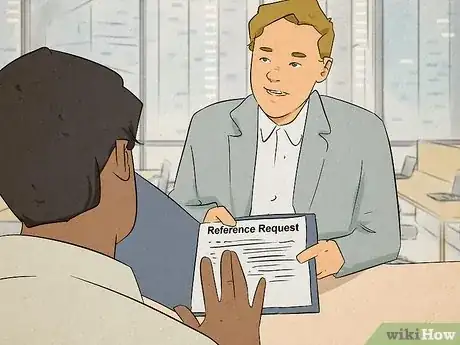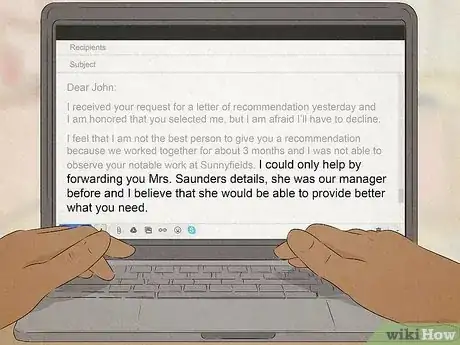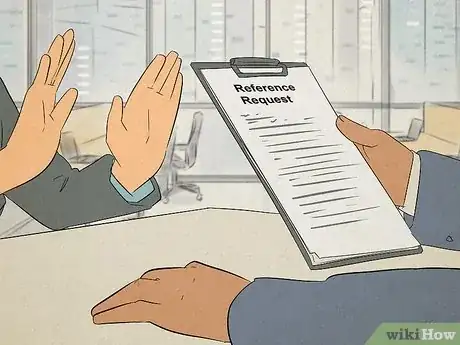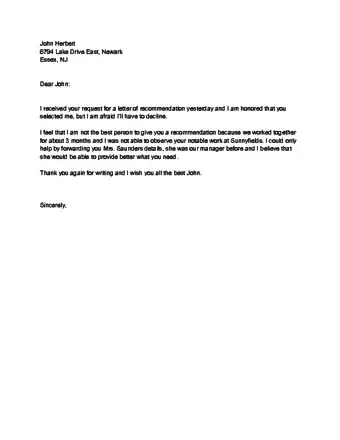This article was co-authored by Katherine Kirkinis, Ed.M., MA. Katherine Kirkinis is a Career Coach and Psychotherapist who has served as a career expert for Forbes, Medium, Best Life, and Working Mother Magazine, and as a diversity and inclusion expert for ATTN and Quartz. She specializes in working with issues of career, identity, and indecision. She has doctoral-level training in career counseling and career assessment and has worked with hundreds of clients to make career decisions through career assessments. She is pursuing a doctoral degree at The University of Albany, SUNY where her work focuses on diversity and inclusion, racism in the workplace, and racial identity. She is a published author and has been featured in academic journals as well as popular media outlets. Her research has been presented at 10+ national APA conferences since 2013.
This article has been viewed 30,875 times.
Ideally, when someone asks you to refer them, you feel honored and enthusiastic. There may be times, however, when you are asked to provide a reference for someone you feel uncomfortable recommending. Whatever the reasons for your unwillingness, you can turn down a request politely and professionally. By communicating effectively and remaining firm, you can gently and effectively decline the request for a recommendation.
Steps
Communicating Your Refusal Effectively
-
1Be polite. It’s always possible to be both polite and honest. Choose your words carefully, and stick to the point. Keep in mind that the person is asking you because he or she thinks you will provide a good recommendation. Your refusal may cause hurt and disappointment, but courtesy and kindness may soften the blow.
- There’s no reason to say, “No way, you were a terrible employee, and we all hated you!”
- Instead you might say, "Based on our past experiences, I can't in good conscience give you the recommendation you seek."
- Instead of “No way!,” say “I can’t do that.”
-
2Explain that you don't know them well enough. Outlining your reasons for saying no can help ease the situation. If you are turning down the request because you do not know the person well enough, that’s a relatively easy situation to handle.
- You might say, “Since we haven’t worked together long, I don’t think I would be able to provide a strong enough reference for you.”
Advertisement -
3Decline because you can't recommend them. If you are turning down the request because the person’s performance does not merit a recommendation, that’s a bit trickier. Ultimately, though, you need to be honest. Perhaps your refusal will prompt them to work harder in the future.
- You might simply say, “I don’t feel comfortable providing a strong reference for you.”
- Sometimes you're doing the person a favor by declining their request rather than writing them a negative reference. It gives them the opportunity to go find someone else who might have a more positive view of their work.[1]
-
4Tell the truth. Lying might resolve the situation temporarily, but it’s likely to catch up to you. Ultimately, it does not help you or the person who needs the reference. You don’t need to be blunt to the point of rudeness, but you should not invent excuses for turning the person down.[2]
-
5Keep your conversation concise. You can probably explain yourself in a sentence or two. You don’t need to expand on your reasons or lecture the person unnecessarily. Simply say no, state your reason briefly, and consider suggesting someone else.[3]
Remaining Firm
-
1Resist the urge to apologize. People tend to apologize excessively when they feel uncomfortable. Apologizing once is acceptable, but saying you are sorry again and again does not help the person. It only makes the situation more awkward.
- Remember you are not doing anything wrong.
-
2Consider suggesting alternative references. If you feel comfortable doing so, you can suggest that the person ask someone else. Recommending someone else works best if you are turning down the request because you don’t know the person well enough. This also helps to make it clear that your decision is final.[4]
- You might say, “Try asking Jill. She’s worked with you for much longer than I have.”
- If you can’t recommend the person based on his or her performance, try suggesting alternatives. Turn down the request and follow up with “Perhaps Amy might be able to help.”
-
3Stick to your decision. Once you have turned someone down for a reference, do not reconsider just because the person begs, argues, or otherwise attempts to change your mind. If you give in, you’ll only wind up in a trickier situation: providing a difficult reference that compromises your integrity. Stay strong!
Sample Email
References
- ↑ Katherine Kirkinis, Ed.M., MA. Career Coach & Psychotherapist. Expert Interview. 14 October 2020.
- ↑ https://www.themuse.com/advice/just-say-no-your-guide-to-turning-down-a-reference-request
- ↑ https://www.themuse.com/advice/just-say-no-your-guide-to-turning-down-a-reference-request
- ↑ https://www.thebalance.com/turning-down-request-for-reference-2062996






























































